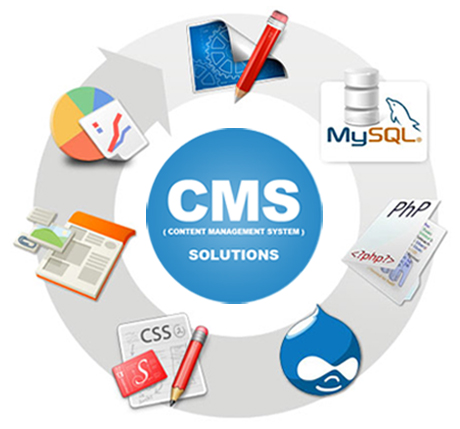What is Content Management Systems (CMS)?
A content management system is an application/software that enables you to create, edit, organize and publish content for your website. There is normally an administrator panel where you can create pages, posts, articles, and visual items (images, slideshow, and videos).
In the admin panel, you can install themes that you can use to change the design of your website and change the placement of content on your site. You don’t necessarily need to code, but it is simply done by the use of the buttons.
Use of CMS
CMS allows you to upload and manage the content for your website.
It functions on the back end of your website, where you can manage the content, the visuals, and the general layout of the website.
CMS platforms are user-friendly and can be used by those who are illiterate in technology.
Each CMS platform has its own themes and plugins that add functionality to the website.
Benefits of CMS platforms in businesses
Online Marketing (e-commerce websites) – There are various CMS platforms that you can use to create your store. It can either be your own personal store or a platform to advertise other people’s businesses and services. A shopping cart plugin/module/extension can also be integrated into an existing website.
All Businesses – Websites have become necessary for all kinds of businesses, you can advertise what the company is about and what it offers.
Hotel Booking – There are certain platforms that are meant for booking rooms, and hotels, getting reservations, and finding hotels in certain areas.
Schools – The diversity of CMS platforms has enabled school portals and platforms where teachers and parents can converse in certain forums to address ideas. This doesn’t necessitate teachers having to go to school to know their children’s progress.
Restaurants – There are CMS platforms suitable for restaurants and can be used to add, update menus, create coupons, and offers, and customers can make reservations online at ease.
Open Source CMS
Open Source CMS is the kind that source code is visible and open to the public. You can easily change the codes used to suit your preferences and the styles used.
You can also edit, customize and use the core files to improve the visual of the platform your website has used. Open source CMS has lower costs and is created and managed by a community of developers e.g. Joomla.
Advantages of Open Source CMS
Open source CMS is flexible and can fit the needs of many businesses due to its wide variety of options. This mainly works with the use of certain features, extensions, add-ons, and plugins created by the community of developers.
An open source CMS does not involve any fees to use the platform. However, advanced features, themes, and hosting services may require some payment.
Disadvantages of Open Source CMS
Open source CMS software can easily have security issues because of certain modules and plugins used, yet they are outdated.
In case your website gets issues, you can’t be guaranteed to get support from the platform you’ve used. Issues that are normally dealt with are those related directly to the installed platform.
Closed Source CMS.
A closed-source CMS is trademarked and is expensive to use.
Advantages of closed source CMS
Closed source CMS are registered, and thus these applications normally undergo a serious testing process. They are more secure.
There is personalized support to help troubleshoot any problems with your website, though at a cost.
Disadvantages of closed source CMS
Closed source CMS are quite expensive.
They are not quite flexible, nevertheless, there are fewer options for customization and some customizing features need to be paid for.
Trizah provides writing assistance (blog writing, web content writing, e-book writing, technical & documentation writing, ghost writing, copy writing & other writing forms), coaching, web development, market research, product research, app testing, and virtual assistant services.
Her educational background in writing, website design, and community development has given her a broad base from which to approach many topics. She has also worked independently on Upwork. She also enjoys embracing innovations, art and new designs 🙂 Hire Trizah for your online freelance services today!
X (Formerly Twitter)||Linkedin||Medium||Instagram
My blogposts can be found here.
Discover more from Intela Designs
Subscribe to get the latest posts sent to your email.

2 Responses
Really Appreciate this blog post, is there any way I can receive an email sent to me every time you publish a fresh update?
Yes, simply subscribe using the “subscription form” on the right menu bar. Thank you.